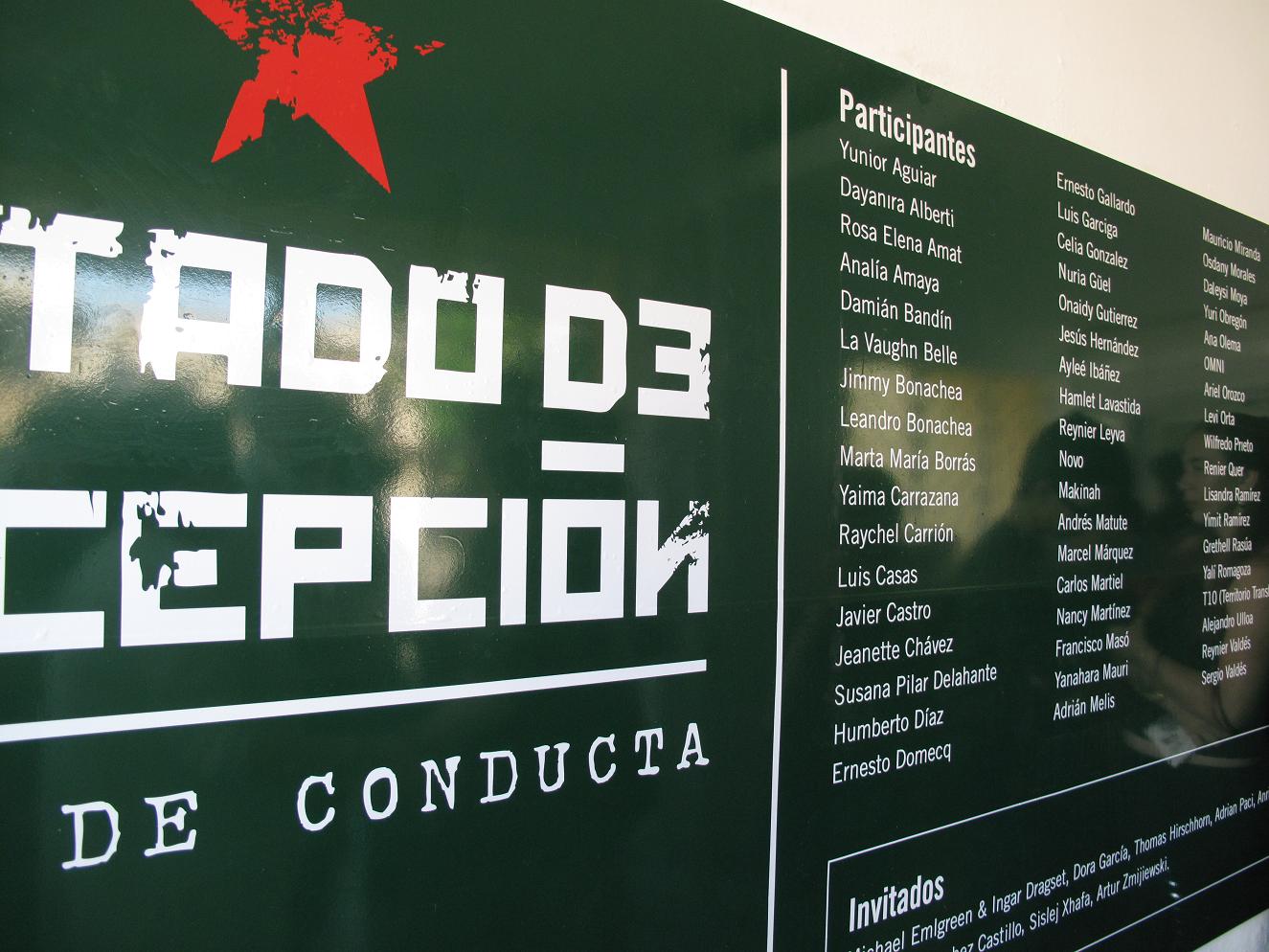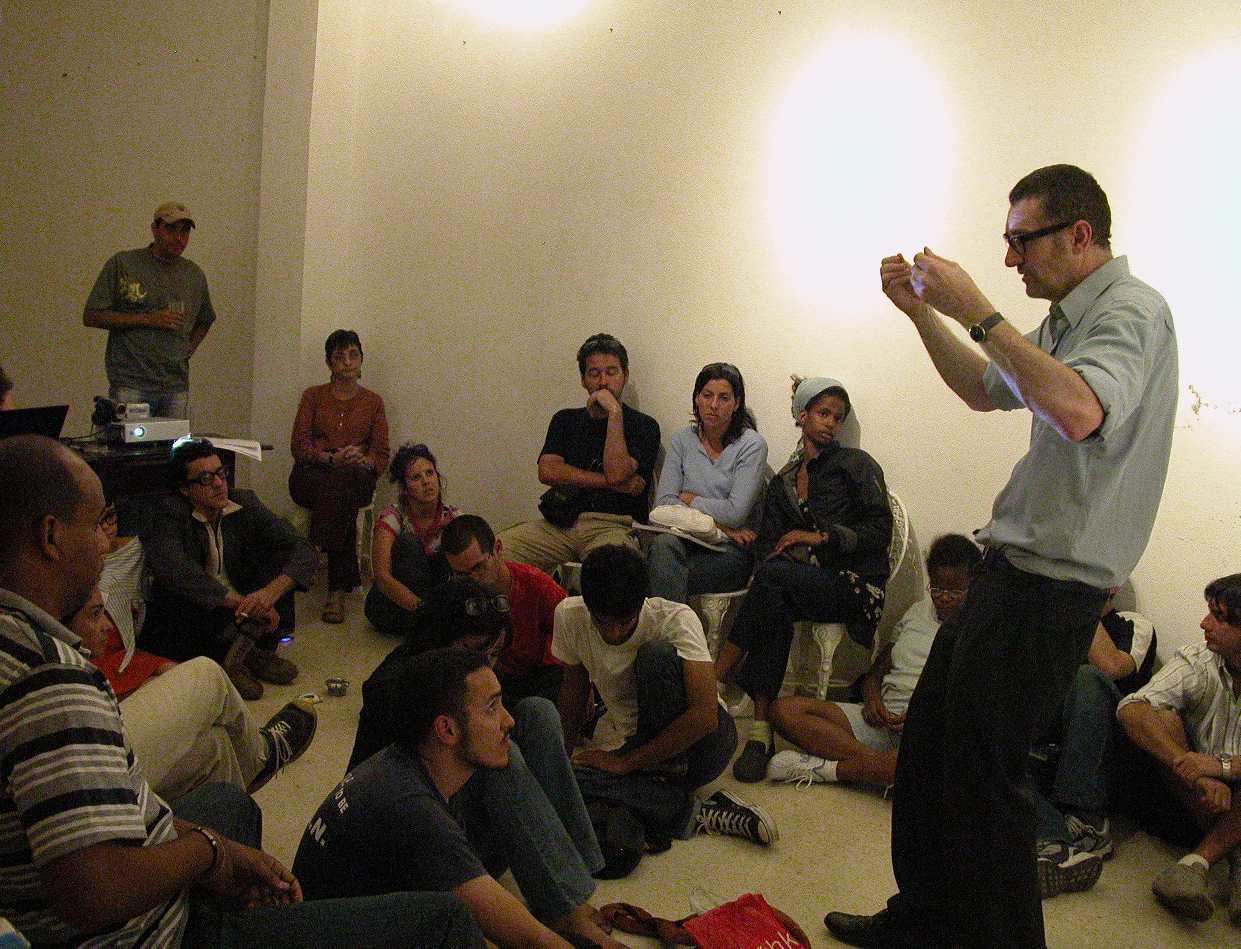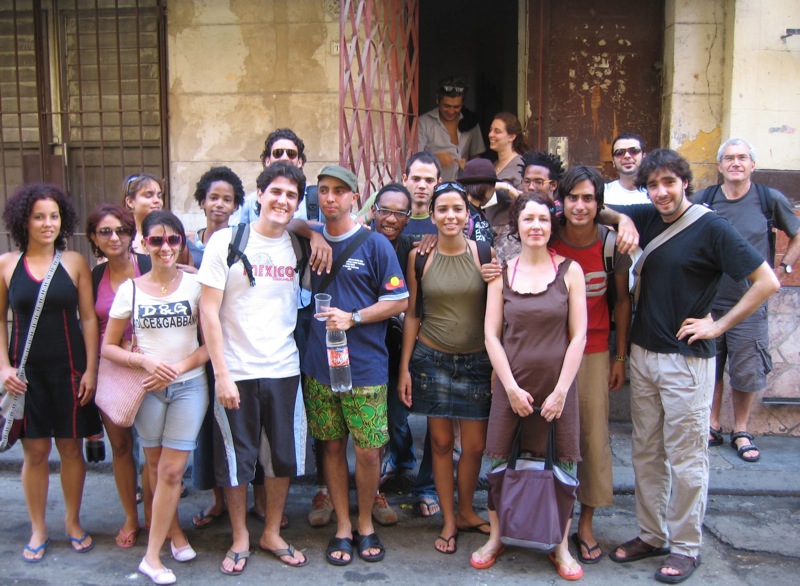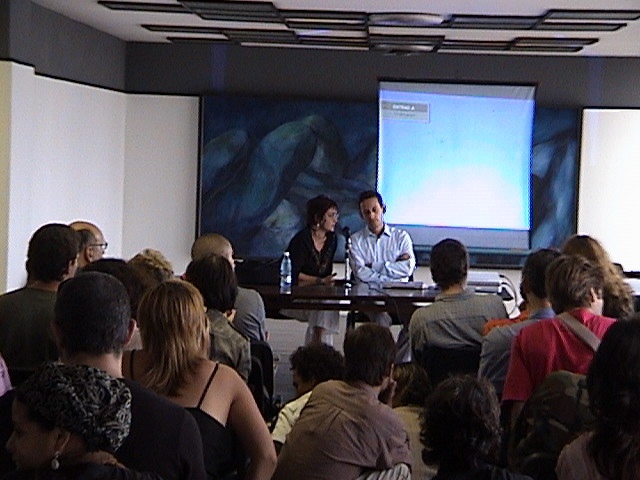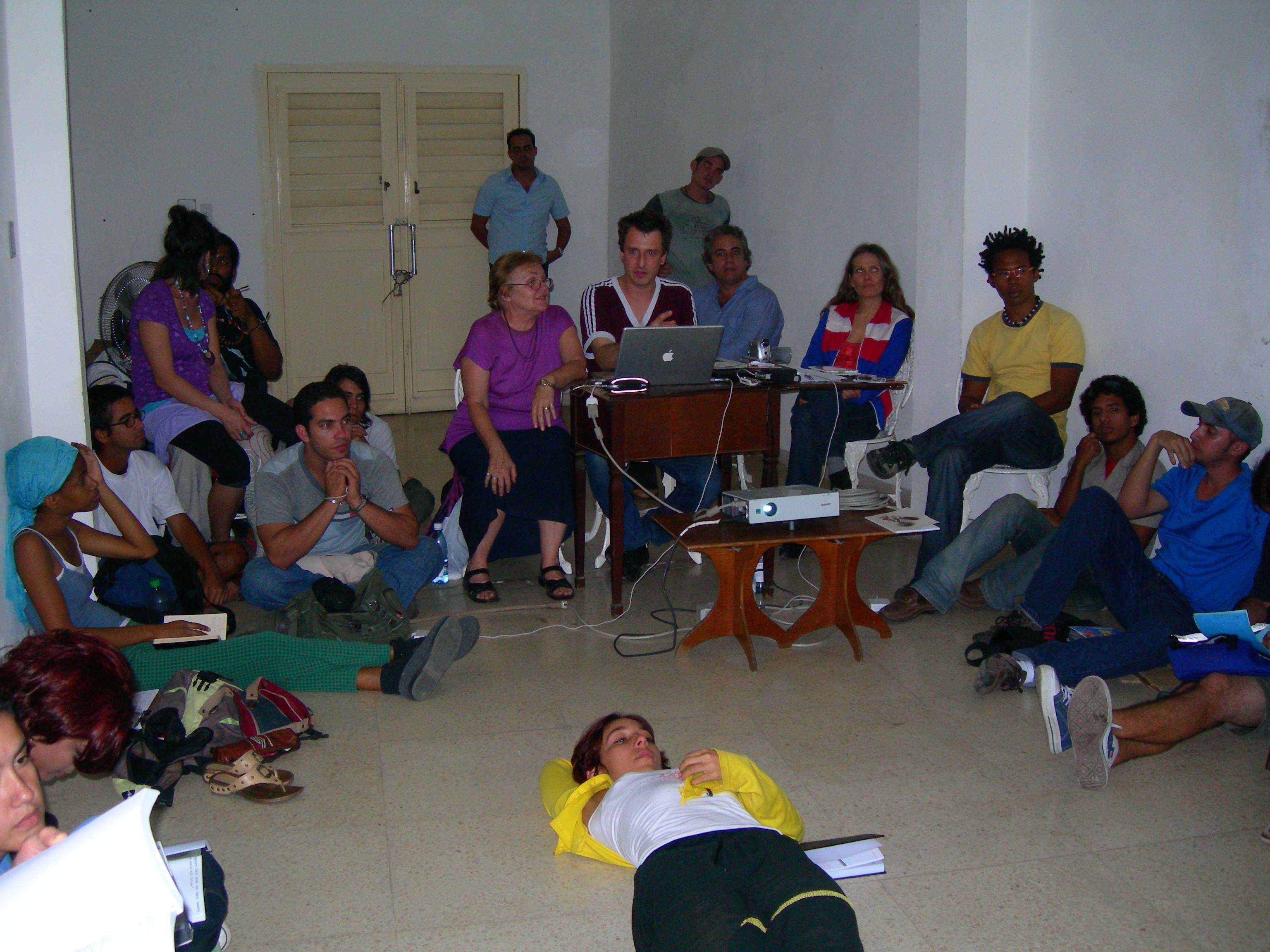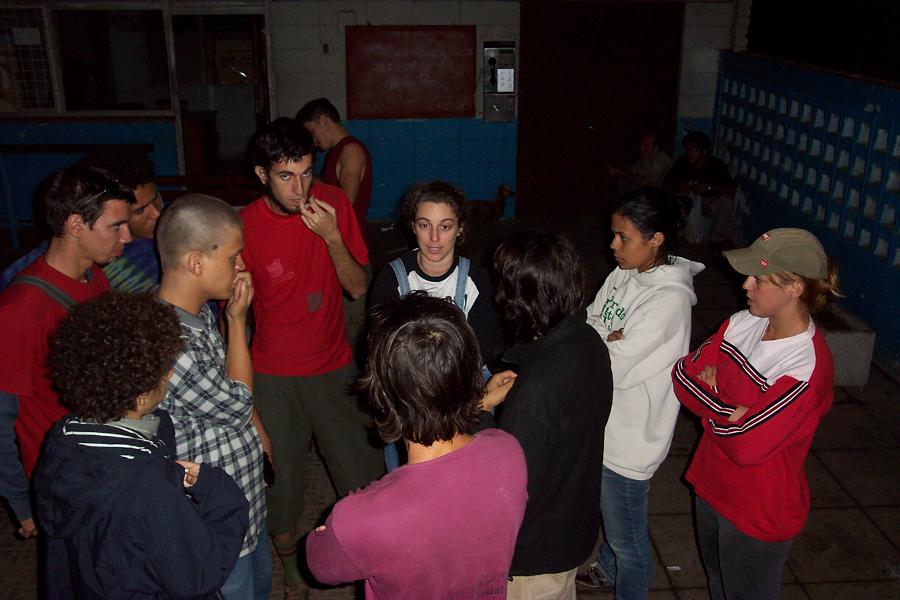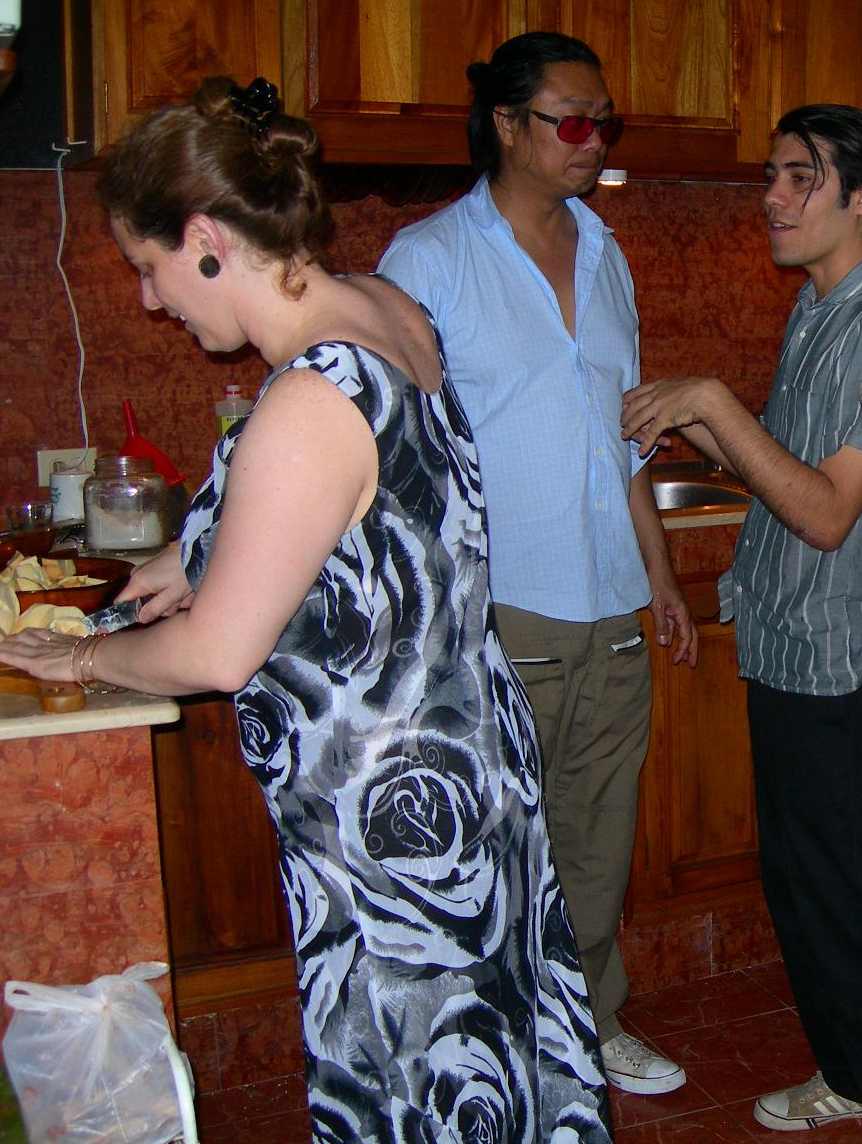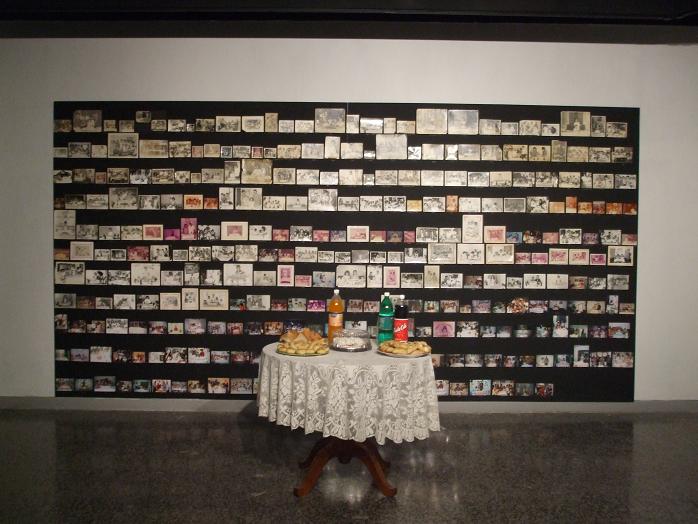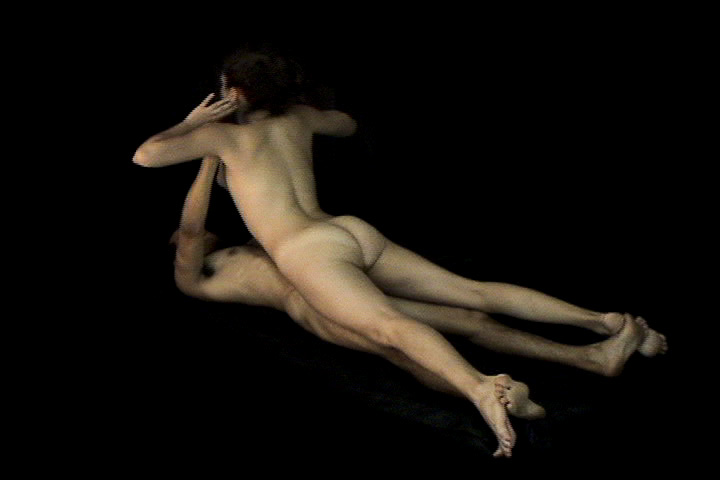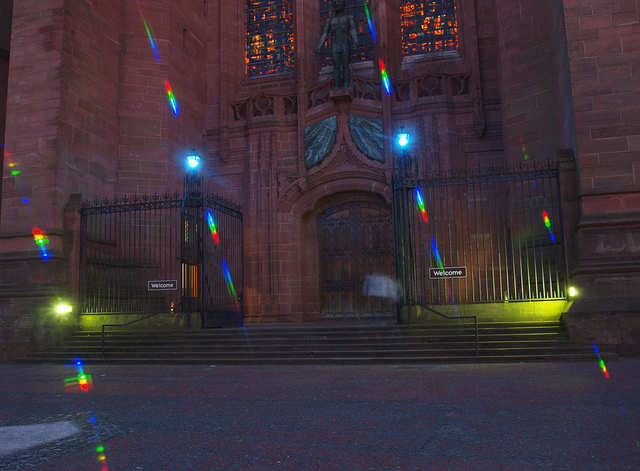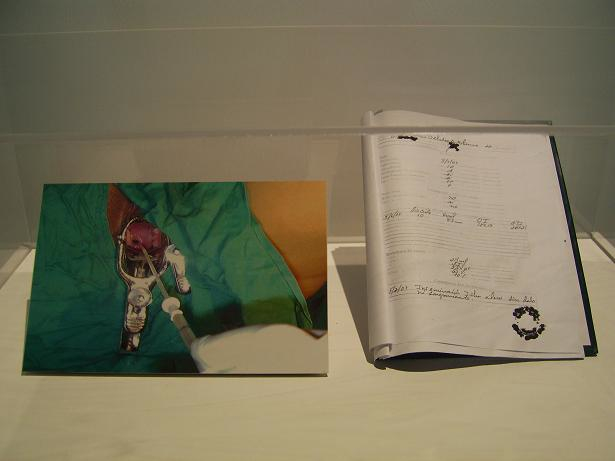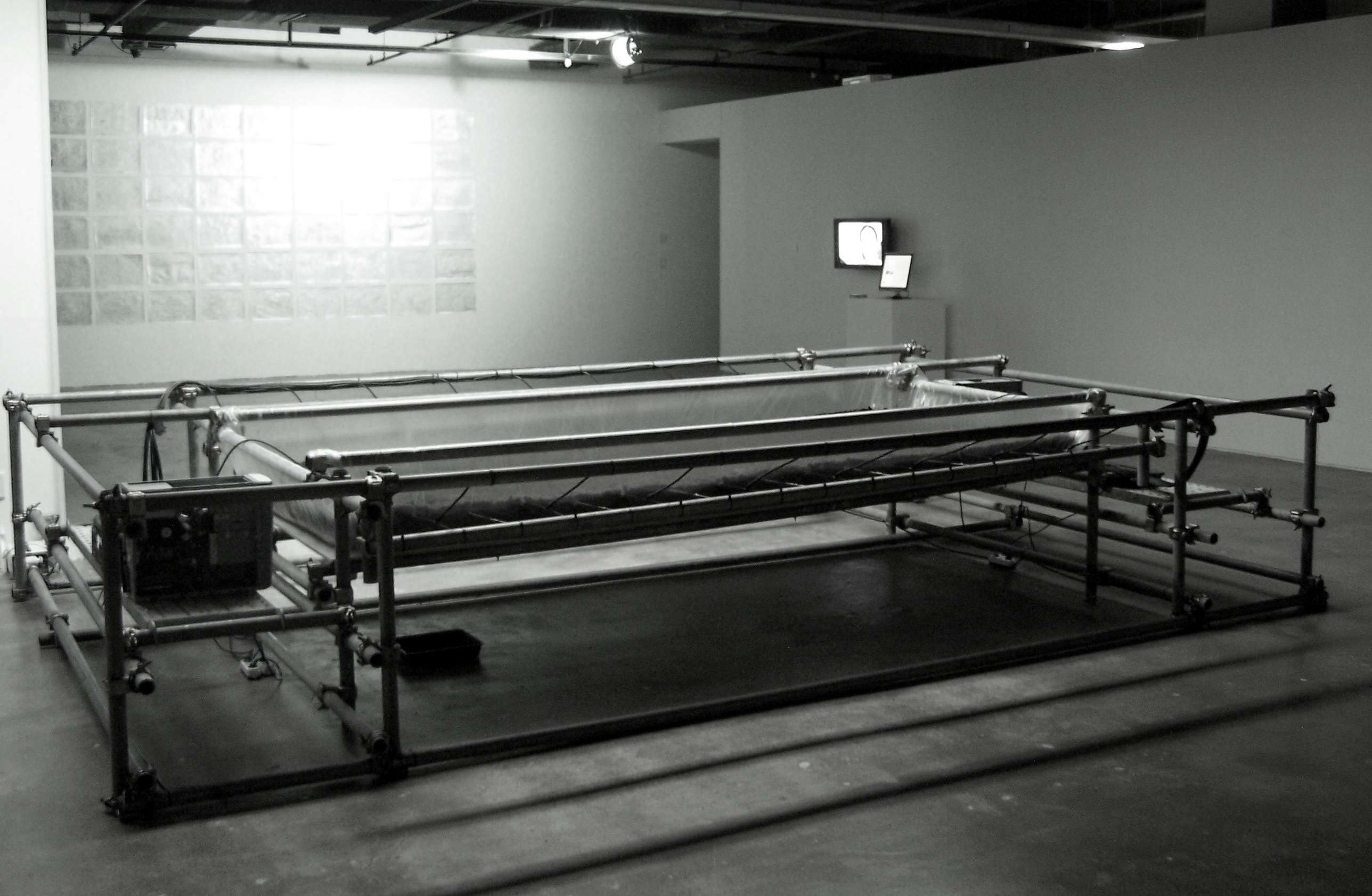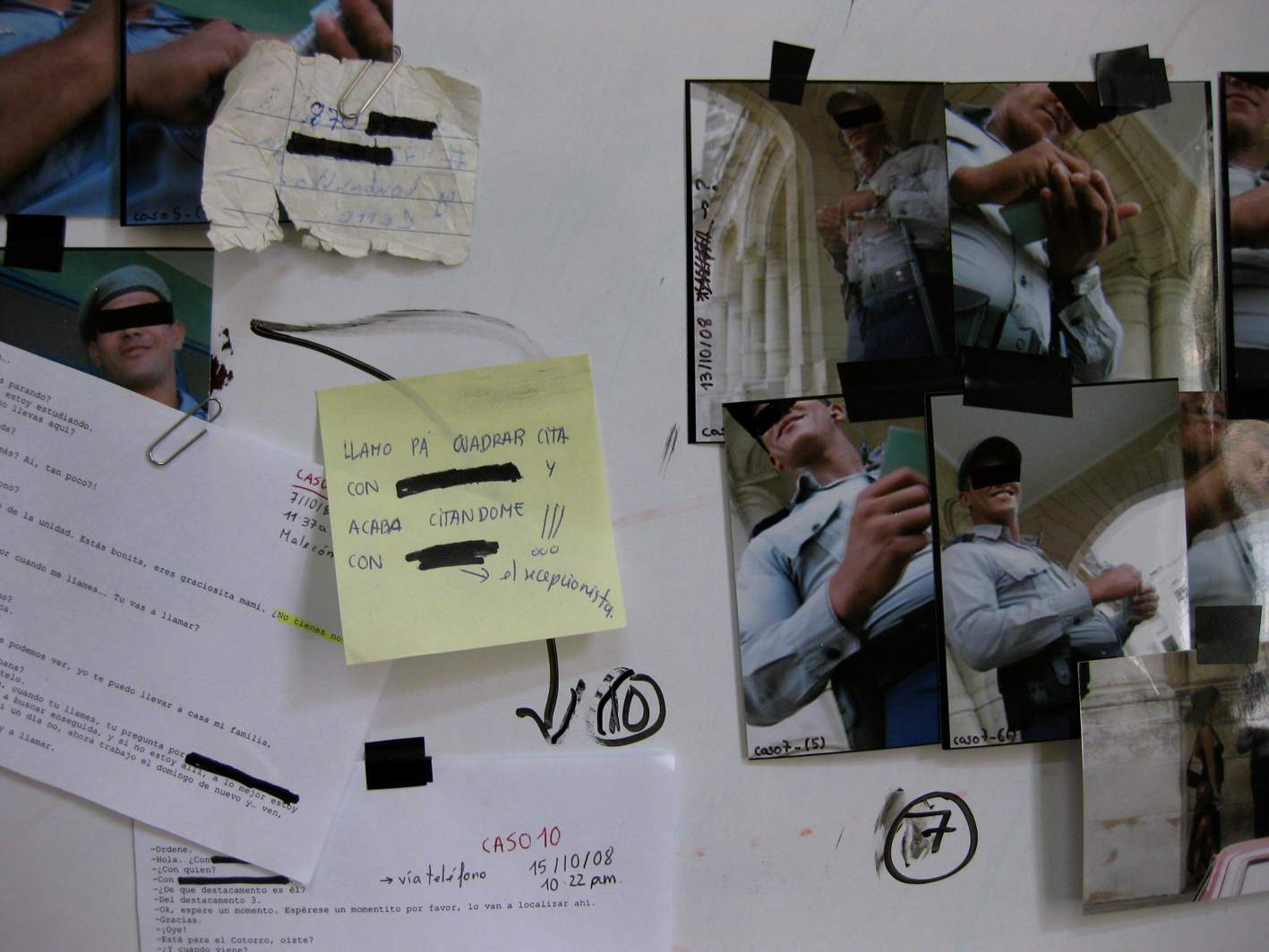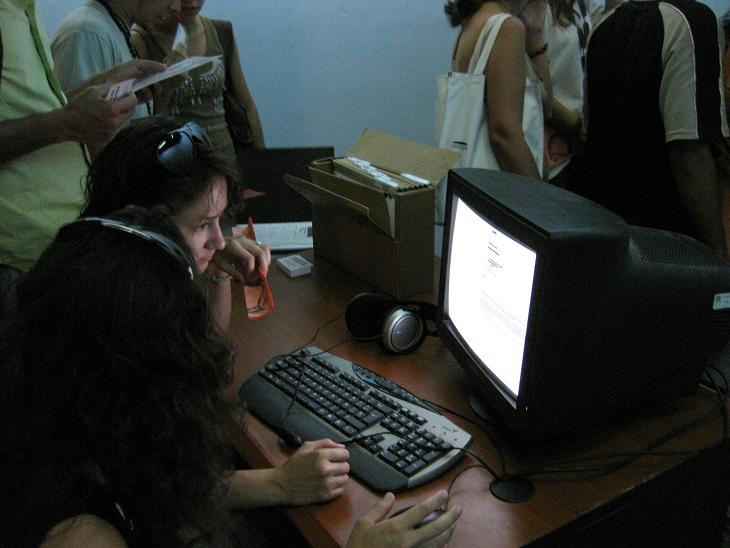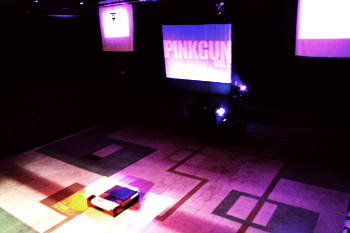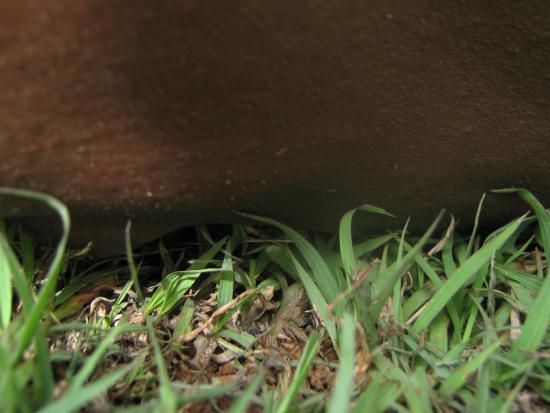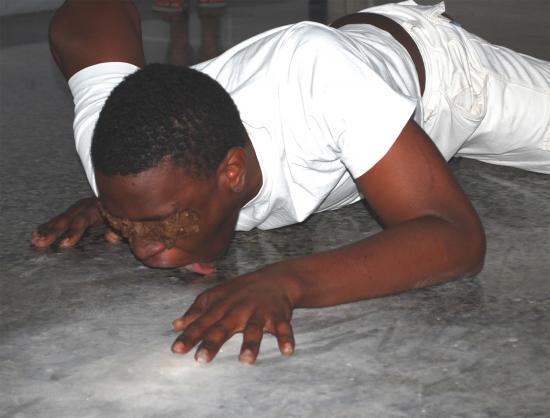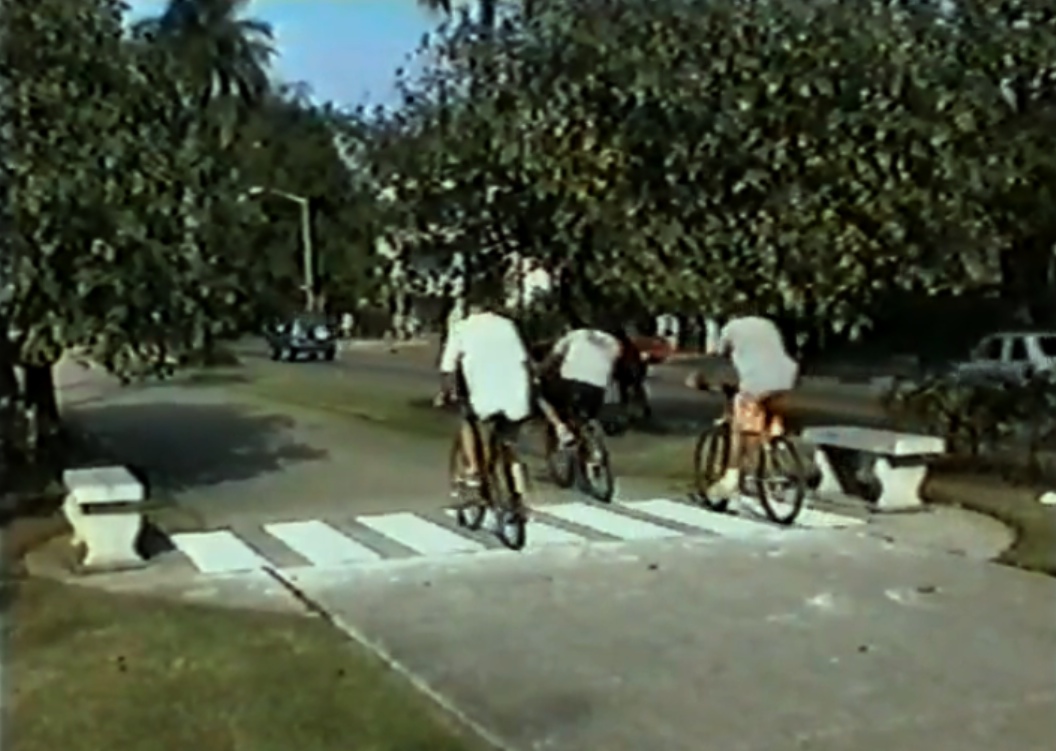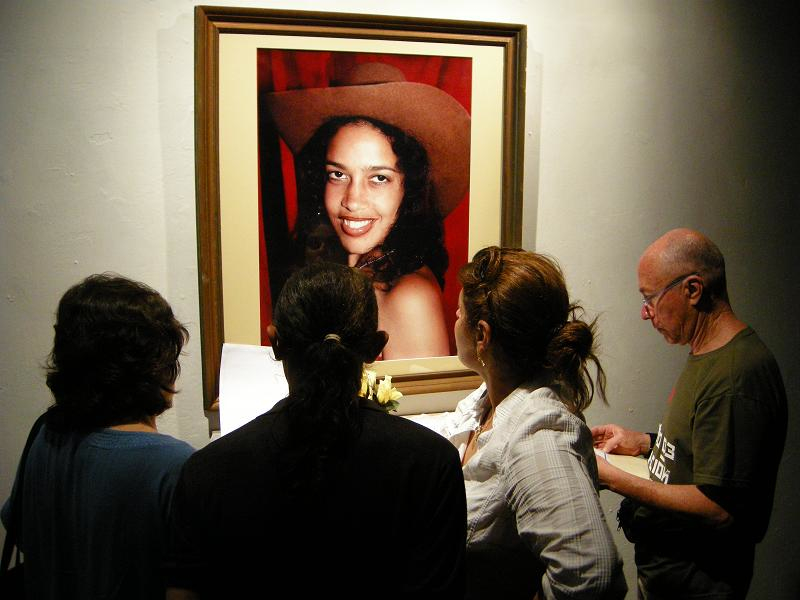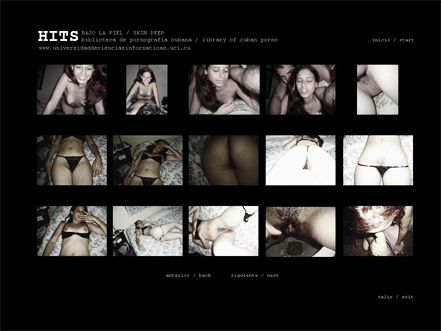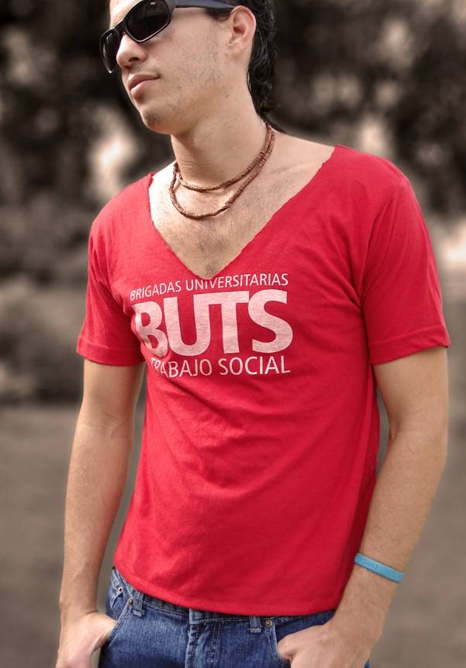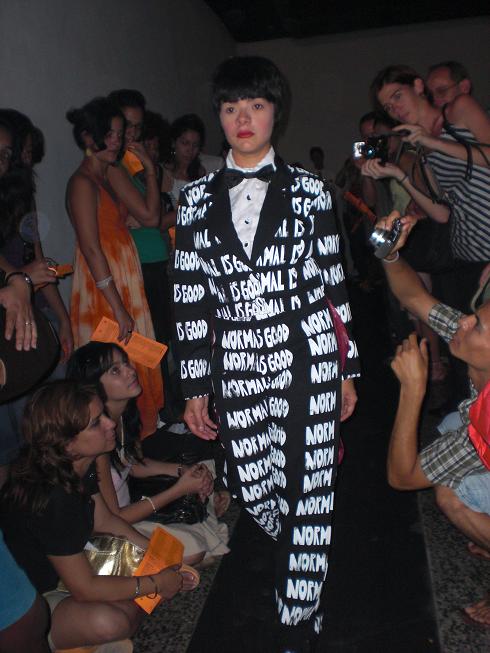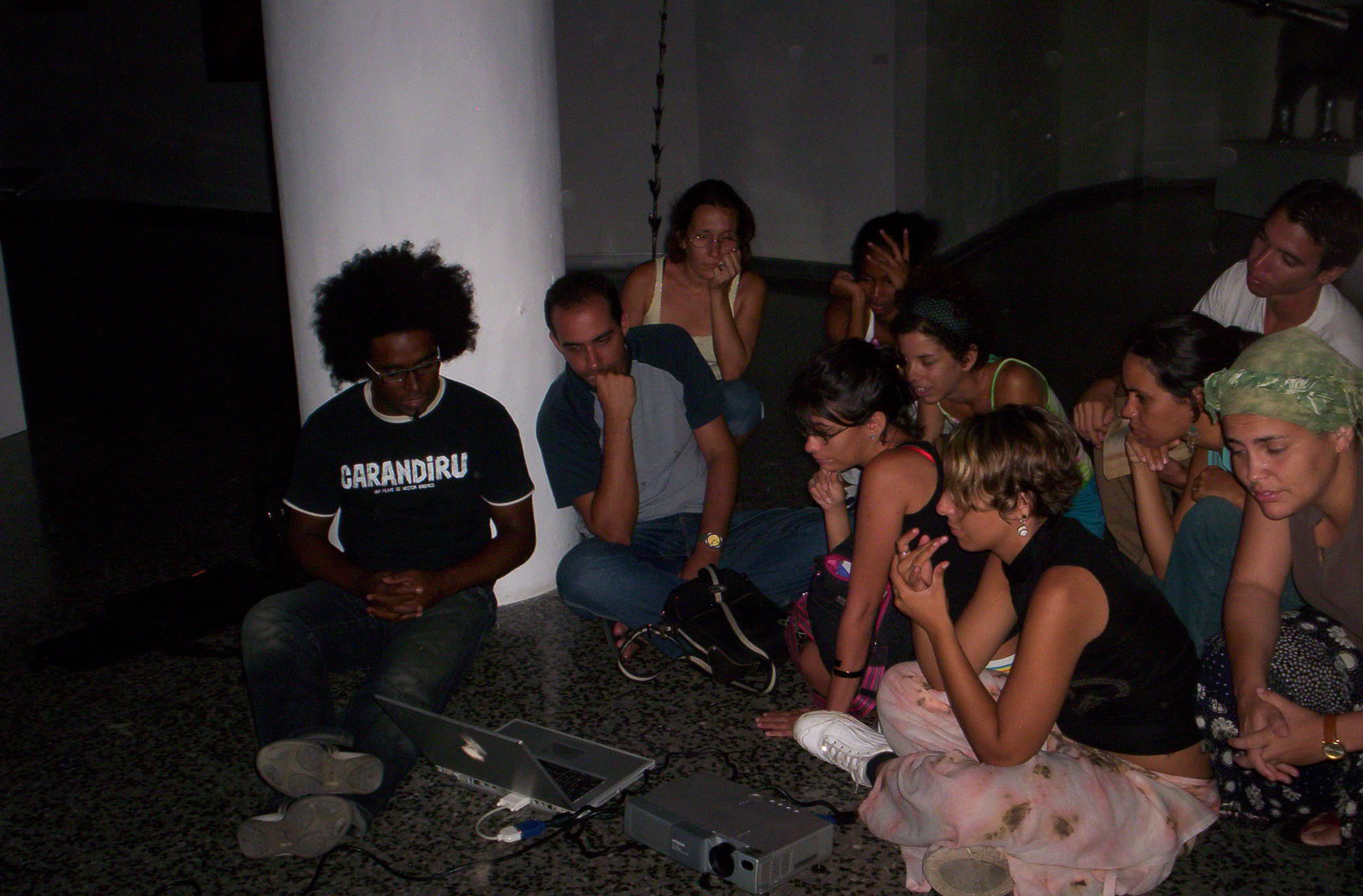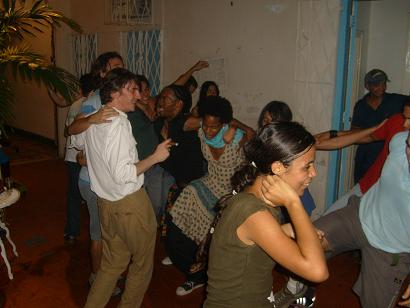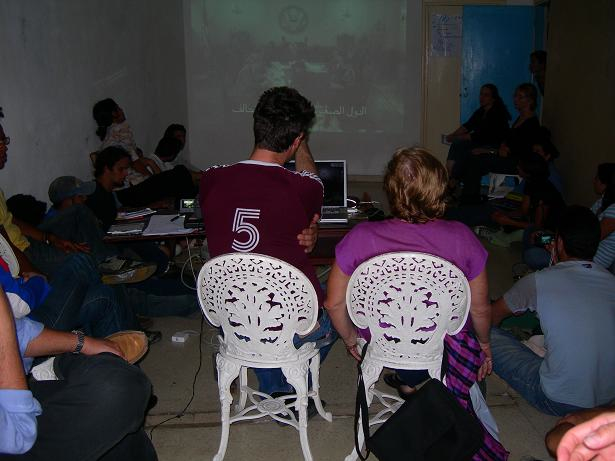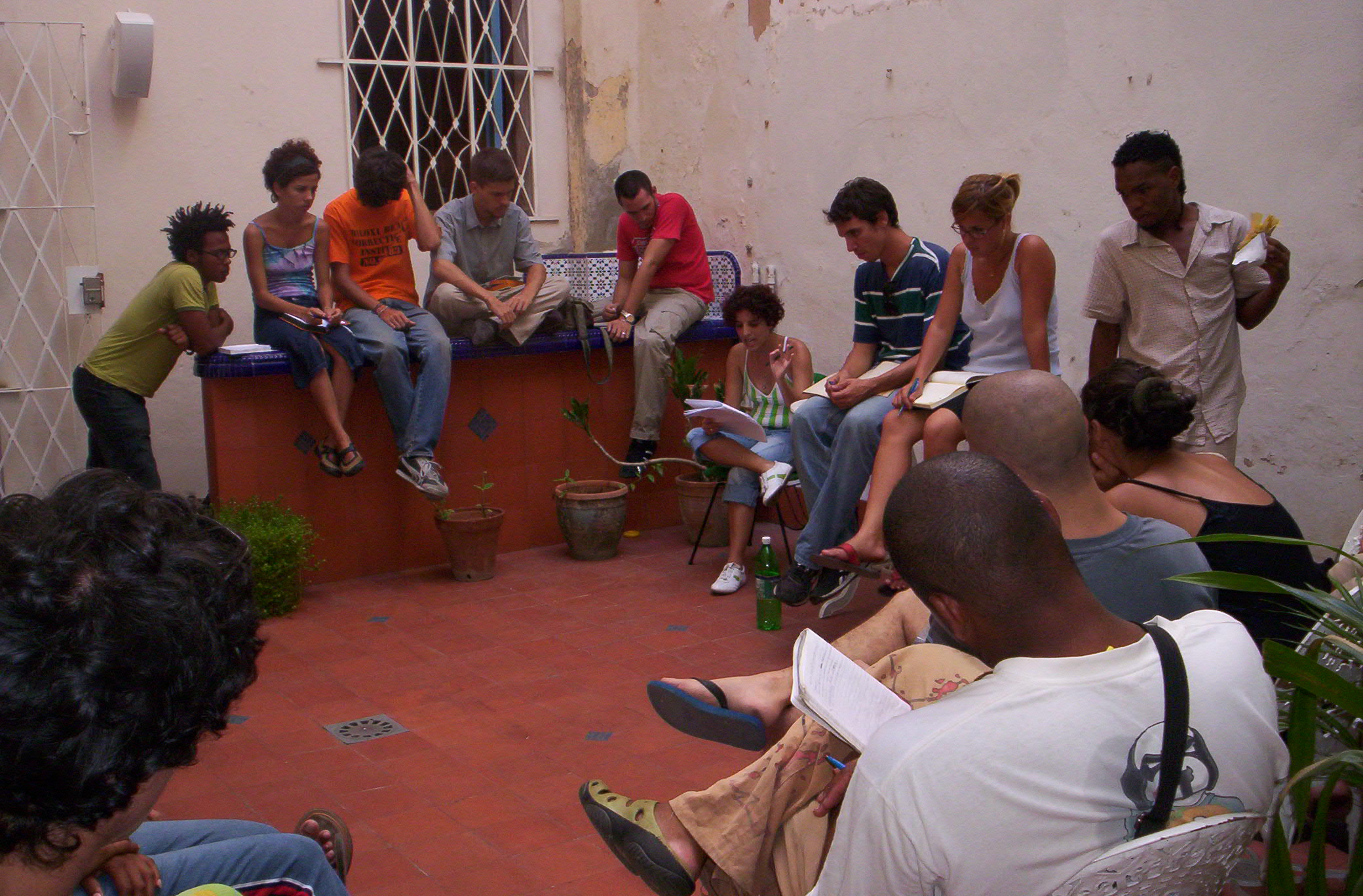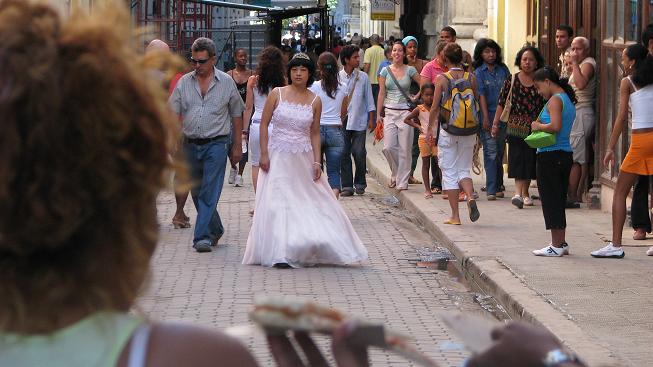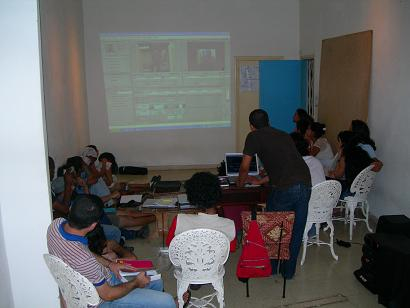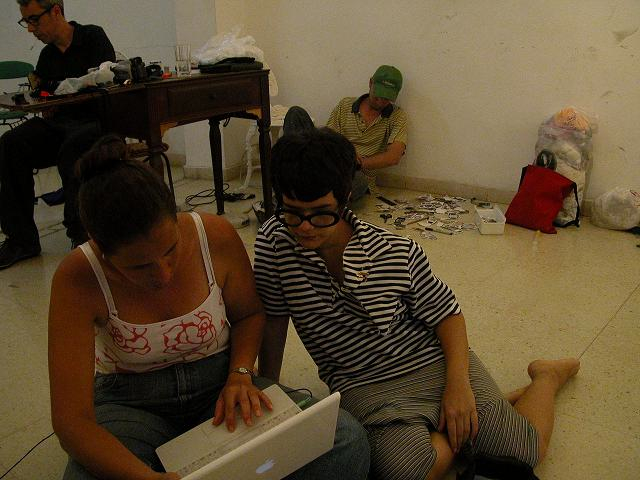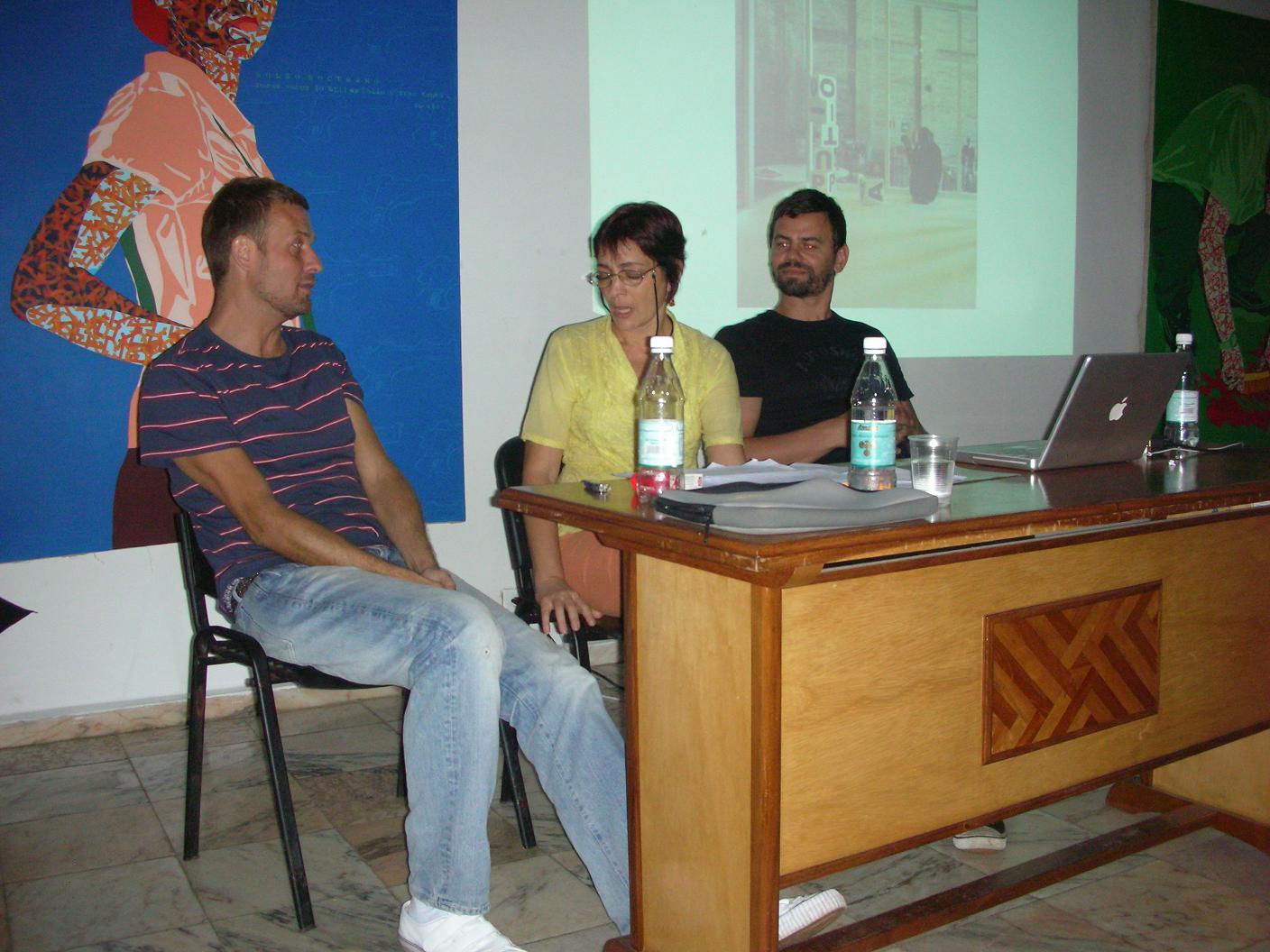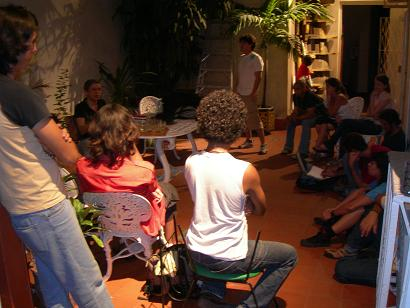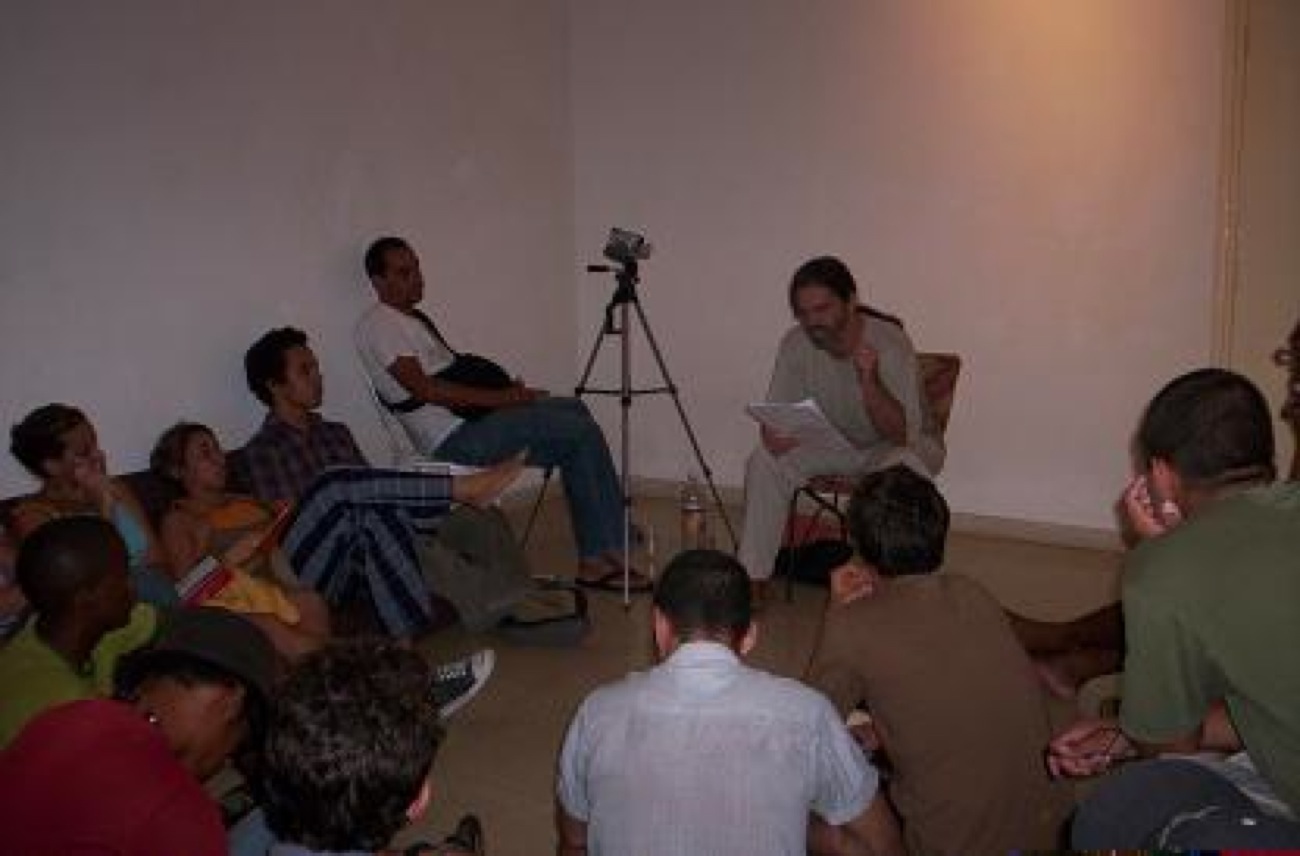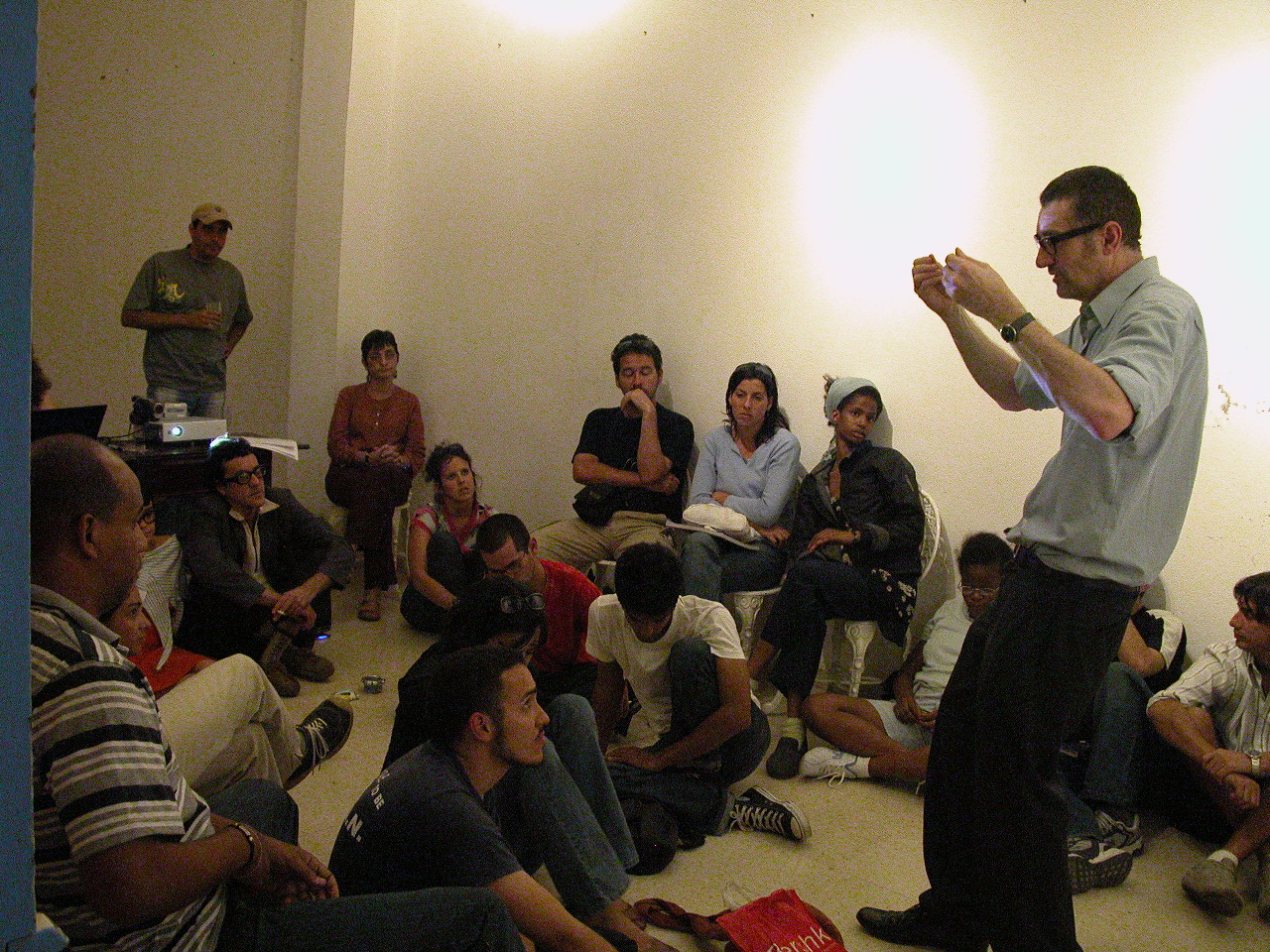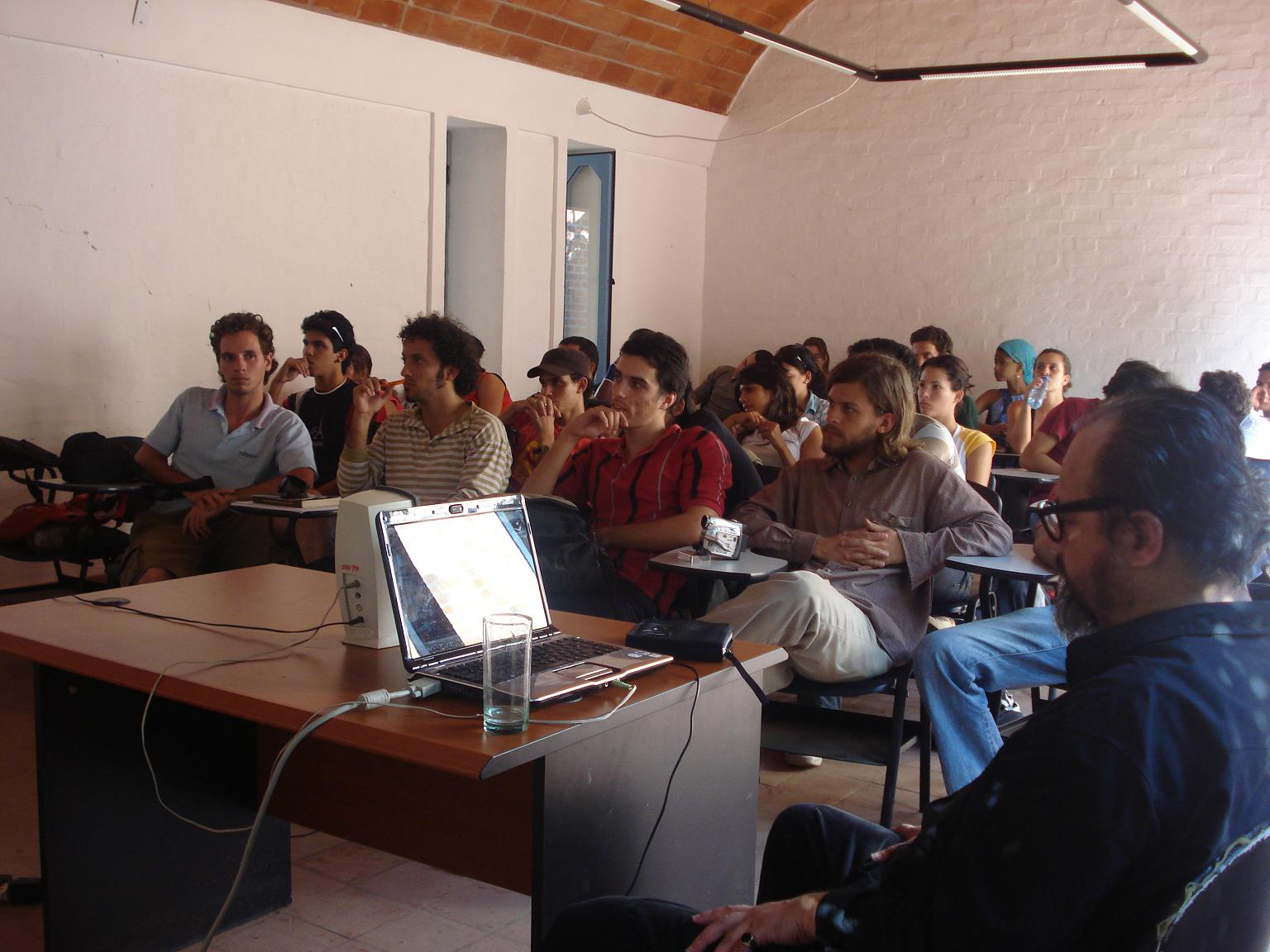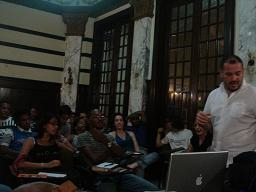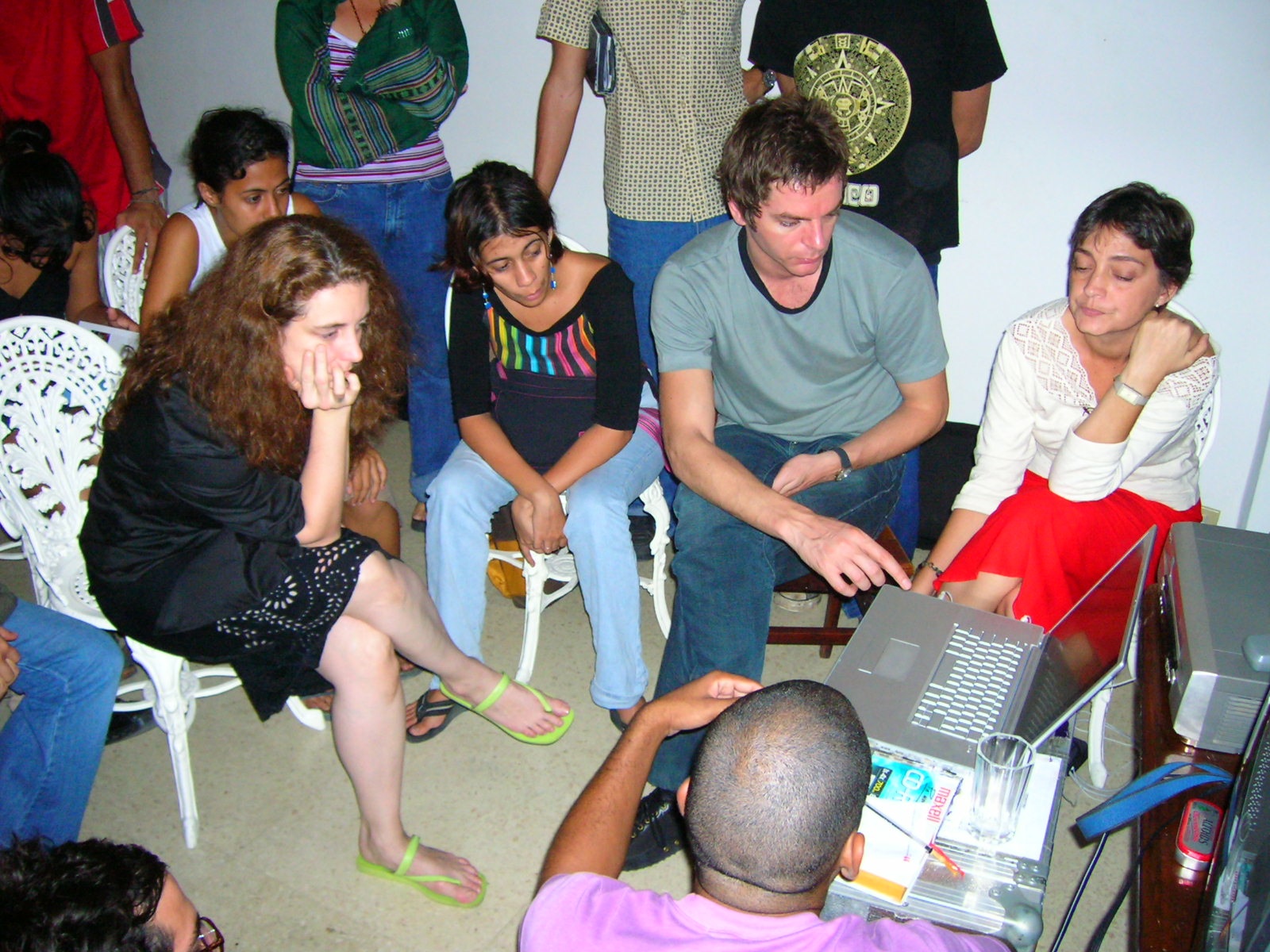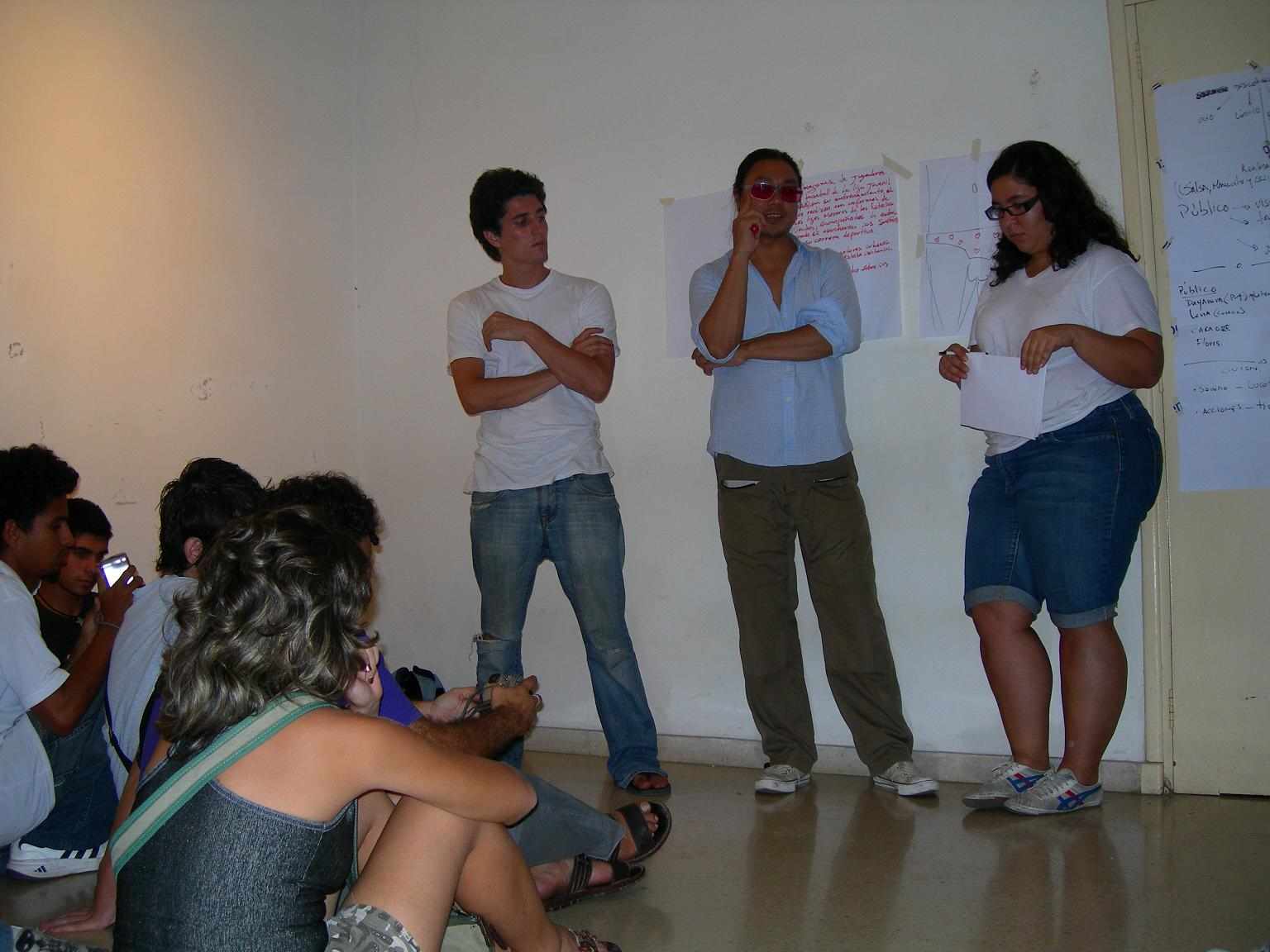Title: Behavior Art School (Cátedra Arte de Conducta)
Conception year: 1998
Founder and Director: Tania Bruguera
Implementation years: 2002-2009
Medium: Behavior Art (Arte de Conducta), Useful Art (Arte Útil)
Duration: Long-term project
Location: Havana, Cuba
Materials: Configuration of an Institution, Education Formats, Public Gathering, Study of the Relationship Between the Performative Arts and Politics and its implementation in Society.
Statement
Cátedra Arte de Conducta (Behavior Art Department – 2002-2009) emerged like a piece of public art intended to create a space of alternative training to the system of art studies in contemporary Cuban society. It is a Long Term Intervention focused in the discussion and analysis of sociopolitical behavior and the understanding of art as an instrument for the transformation of ideology through the activation of civic action on its environment. It was created as a space for the practice of Arte de Conducta1(Behavior Art). Actions aimed to transform some spaces in society through art, transcending symbolic representation or metaphor and meeting with their activity some deficits in reality, in life through ArteÚtil2(Useful Art), are prioritized. This site and political-timing specific3
Members of the project come from various fields – architecture, theater, writing, engineering, set design, music, cinema, sociology, visual arts, history of art and even self-taught artists. All the activities of the Catedra Arte de Conducta are free of charge and open to every type of audience interested in participating. All workshops last for a week and, just like the members of the project, guest professors come from various areas of social life:lawyers, architects, visual artists, art dealers, curators, writers, scientists, dancers, former convicts, theater directors, scriptwriters, actors, anthropologists, mathematicians andso on. Because of the scarce access to sources of information in Cuba, the Cátedra Arte de Conducta took the first steps for the creation of a specialized archive in international contemporary art, giving special importance to performance and social issues, through subscriptions to magazines on art and contemporary sociology and buying books on theory of culture and art history. The project favored exchange among schools in various countries, art projects and international residences, as well as with important figures or Cuban art and criticism of various generations, thus establishing an interaction with diverse systems of thought. Members of the project manage a flow of information allowing them to understand and choose their position vis-à-vis art and society.
The Department had established to hold thematic exhibitions, generally having to do with the national sociopolitical context, that would be held every six months. Its members made pieces participating in events organized by guest curators. After six years of continuous exercise, these creative and critical experiences have given rise to one of the most experimental and radical guidelines in present Cuban art production.
Cátedra Arte de Conducta is the first work of art and, at the same time, the first institution focusing in creating a curriculum of Behavior Art and of Political Art. Thus it has become a model for educational projects of a social and artistic nature and for artistic projects focused in offering educational activities.
Exhibited
| 2003 | |
|
Performance in Reverse Exchange between San Francisco Art Instituteand Cátedra Arte de Conducta (Behavior Art School). The ruins of the Circus School of the Instituto Superior de Arte (ISA), Havana, Cuba. Curated by Tania Bruguera and Tony Labatt. |
|
|
Paladar
First exhibition at Cátedra Arte de Conducta’s headquarters. Tejadillo 214, home of Tania Bruguera, Havana, Cuba. Curated by Tania Bruguera. |
|
|
|
|
|
Exposición de sonido (Sound Exhibition) Exhibition Cátedra Arte de Conducta. Center for the Development of the Visual Arts (Centro de Desarrollo de las Artes Visuales), CDAV, Havana, Cuba. Curated by Tania Bruguera. |
|
|
Lighting Collective action and exhibition Cátedra Arte de Conducta. Pabellón Cuba, Eighth Havana Biennial, Havana, Cuba. 2003. Curated by RAIN and Eugenio Valdés Figueroa. |
|
| 2004 | |
|
Centrífuga Exhibition Cátedra Arte de Conducta. Center for the Development of the Visual Arts (Centro de Desarrollo de las Artes Visuales), CDAV, Havana, Cuba. Curated by Tania Bruguera, Magaly Espinosa and Eugenio Valdés. |
|
|
Tercera Jornada de Performance de Cienfuegos-Cayo Carenas Performances Cátedra Arte de Conducta. Third Conference on Performance of Cienfuegos, Cienfuegos, Cuba. |
|
| 2005 | |
|
Hueco Hueco exhibition did not materialize as an event, although some individual projects were made and shown at later exhibitions. El Hueco, precarious population settlement located in the Havana municipality of La Lisa, was chosen by the participants and guest curator, Yuneikys Villalonga. |
|
| 2006 | |
|
Parallel to IX Bienal de La Habana Public presentation of the work of the participants of Cátedra Arte de Conducta at Tejadillo 214, project’s headquarters during the IX Havana Biennial, Havana, Cuba. Organized by Tania Bruguera. |
|
|
Rescribible Exhibition–Public presentation Cátedra Arte de Conducta. Tejadillo 214. Curated by Luis Gárciga. |
|
|
Salón Provincial “Oscar Morera” Presentación Cátedra Arte de Conducta.Salón Provincial “Oscar Morera”, Sancti Spíritus, Cuba. |
|
| 2007 | |
|
INTERMEDIAE-Minbak Exchange Cátedra Arte de Conducta, ARCO 07, Madrid, Spain. Curated by Suset Sánchez. |
|
|
Ni a favor ni en contra, todo lo contrario Exhibition Cátedra Arte de Conducta. School for Arts and Letters, University of Havana, Havana, Cuba. Curated by Mailyn Machado. |
|
|
Masa crítica Exhibition Cátedra Arte de Conducta. Center for the Development of the Visual Arts (Centro de Desarrollo de las Artes Visuales), CDAV, Havana, Cuba. Curated by Sandra Sosa. |
|
| 2008 | |
|
USB Exhibition. Cátedra Arte de Conducta. Park of the G Street and 23 Street, Havana, Cuba. Curated by Rosa Hermida. |
|
|
Le Fresnoy/Habana Remix Exhibition Cátedra Arte de Conducta. National Museum of Fine Arts. Havana, Cuba. Curated by Mailyn Machado. |
|
|
Defensa eslava Exhibition Cátedra Arte de Conducta. Mall “Carlos III”, Havana, Cuba. Curated by Frency Fernández. |
|
|
Bomba Lógica Exhibition Cátedra Arte de Conducta. Seventh Biennial of Gwangju, South Korea. Curated by Okwui Enwezor. |
|
|
Esto no es lo que parece Exhibition Cátedra Arte de Conducta. University Student House. Havana, Cuba. Curated by Darys Vasquez. |
|
| 2009 | |
|
Estado de excepción Exhibition Cátedra Arte de Conducta. Galería Habana,TenthHavana Biennial, Havana Cuba. Curated by Tania Bruguera and Mailyn Machado. |
|
|
Per Diem Residency-Exhibition Cátedra Arte de Conducta. in Bétonsalon Centred’art et de recherche, Paris, France. Curated by Melanie Bouteloup and Tania Bruguera. |
|
| 2010 | |
|
Touched Exhibition Cátedra Arte de Conducta. Tenth International Biennial of Liverpool, Liverpool, England. Curated by Lorenzo Fusi. |
|
Documentation
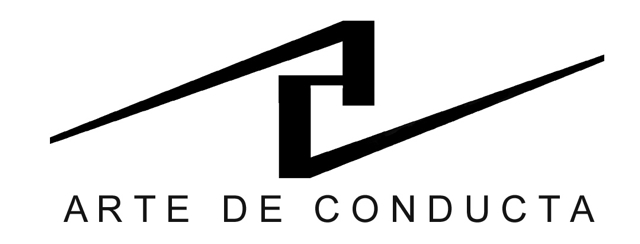
(By alphabetical order)
|
Alumni works |
Guests | |
|
Amat, Rosa Elena Year: 2009
Medium: Installation Materials: Table, tablecloth,
Bithday Cake, refreshment
Medium: Performance
photos.
@Rosa Elena Amat
Amaya, Analía / Díaz, Humberto Title:Calentamiento (Warm-up) Year: 2007
Medium: Video @Analía Amaya/Humberto Díaz
Bonachea, James Title: Orden Público (Public Order) Year: 2010 Medium: Intervention in public
Space at Liverpool‘s Anglican
Cathedral.
Materials:Lightsofsirensusedin
Britishpolice patrols.
@James Bonachea
Delahante, Susana Pilar Title:El escándalo de lo Real (The Scandal of the Real) Year: 2006-2007 Medium: Artificial Manipulation
Materials: Semen, Insemination
@Susana Pilar Delahante
Title: Auto Organization of North Corea and South Corea, Cultive of 2000 Worms, two PCs, Organic Matter,two Radio receiver cards, Electrical Circuits, Scaffolds @Fidel García
García, Fidel (T10) three Laptop and Monitor LCD, Router, Internet, Modular structures @Fidel García
Title:Aportación de agentes del orden (Police Officers Contribution) Year: 2009, Havana Medium: Action Experience: material of espionage
exhibition of documentation of the work:
Blackboard with documentation
@Nuria Güell
Title:Acceso a lo denegado (Access to what is denied) Year: 2008, Havana Medium: Public Service
Experience: Internet service,
Etecsa contracts, information
exchange, the town crier,
advertising, computers
@Nuria Güell
Márquez, Marcel Title:Pinkgun -Vol.2 (+Turbo) Year: 2008 Medium: Performance
Materials:Video, House Music,
audience, Djs, disco.
@Marcel Márquez
Martiel, Carlos Title:Sabiduría (Wisdom) Year: 2007
Medium: Performance ©Photo:Rolando Vázquez
@Carlos Martiel
Martiel, Carlos Title:Integración (Integration) Year: 2009
Medium: Performance ©Photo: Francisco Mazo
@Carlos Martiel
Matute, Andrés Title:Cebra de cal (zebra’s lime) Year: 2009
Medium: Intervention in public Space at Fifth Ave. Havana.
Materials: Video, Cardboard template,
powdered lime.
@Andrés Matute
Olema, Ana Year: 2009
Medium: Performance @Ana Olema
Orta, Levi Title:Bajo la piel (Skin Deep)
Year: 2008
Medium: Performance, Multimedia
@Levi Orta
Orta, Levi Title: Modelos (Models)
Year: 2007
Medium: Video Materials: Video Color
DVCAM, PAL, 16:9,
Stereo Sound,
02:27 min.
@Levi Orta
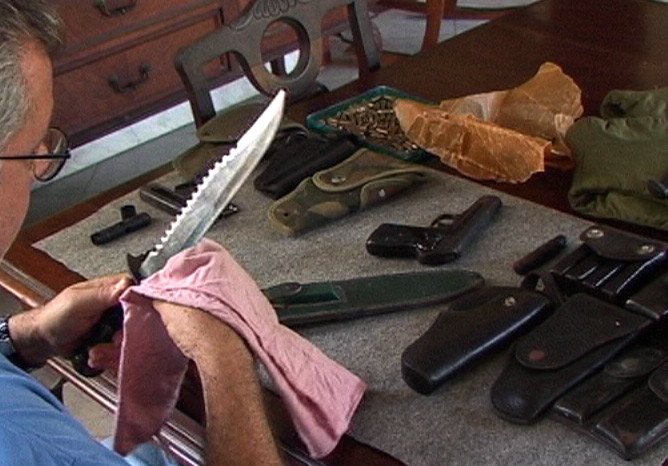 Orta, Levi
Title: Trinchera (Trench)
Year: 2007
Medium: Video Materials: Video Color,
DVCAM, PAL, 16:9,
Stereo Sound,
04:11 min.
@Levi Orta
Romagoza, Yali Title: Normal is Good (Tuxedo Sonorous.
Tribute to Laurie Anderson)
Year: 2009
Medium: Art Fashion Materials: Models
@Yali Romagoza
|
Arrechea, Alexandre Guest 2006
Bishop, Claire Guest 2007
Bourriaud, Nicolas Guest 2007
Bruguera, Tania Guest from 2003 – 2008
Büchel, Christoph Guest 2008
Castro, Elvia Rosa Guest 2004 and 2006
Chang, Patty Guest 2007
Díaz, Humberto Guest 2004 and 2005
Dubois, David Guest 2007
Emlgreen, Michael & Dragset, Ingar Guests 2006
García, Dora Guest 2008
Hernández, Abdel Guest 2006
Hirschhorn, Thomas Guest 2007
Hoffman, Jeff Guest 2006
López, Aníbal Guest 2007
Paci, Adrian Guest 2007
Sala, Anri Guest 2005
Tiravanija, Rirkrit Guest 2008 |
Alumni / Guests
ALUMNI
(By alphabetical order)
|
1. Yunior Aguiar 2. Dayanira Alberdi 3. Rosa Elena Amat 4. Analía Amaya 5. Luis Amigo 6. Glauber Ballestero 7. Damián Bandín 8. La Vaughn Belle 9. Jimmy Bonachea 10. Leandro Bonachea 11. Marta María Borrás 12. Yorjander Capetillo 13. Yaima Carrazana 14. Raychel Carrión 15. Luis Casas 16. Javier Castro 17. Jeanette Chavez 18. Susana Pilar Delahante 19. Yohana Depestre 20. Ernesto Domecq 21. Humberto Díaz 22. Ernesto Gallardo 23. Maikel Galindo 24. Luis Gárciga 25. Omar Gómez |
26. Celia González 27. Núria Güell 28. Onaidy Gutiérrez 29. Ana Olema Hernández 30. Jesús Hernández Güero 31. Ayleé Ibáñez 32. Jesús Jacomino 33. Hamlet Lavastida 34. Reynier Leyva Novo 35. Carlos González (MAKINAH) 36. Yorky Mencía (MAKINAH) 37. René Pedroso (MAKINAH) 38. Jean Pérez 39. Marcel Márquez (Vjs) 40. Carlos Martiel 41. Patricia Martínez Chiroles 42. Nancy Martínez 43. Francisco Masó 44. Andrés Matute 45. Yanahara Mauri 46. Ricardo Miguel 47. Adrián Melis 48. Mauricio Miranda 49. Osdany Morales |
50. Daleysi Moya 51. Miguel Moya 52. Frank Mujika 53. Ariel Orozco 54. Yuri Obregón 55. Levi Orta 56. Amaury Pacheco (OMNI) 57. Dinorah Pérez 58. Wilfredo Prieto 59. Renier Quer 60. Lisandra Ramírez 61. Yimit Ramírez 62. Grethell Rasúa 63. Yosuán Remolina 64. Yalí Romagoza 65. Ana María Socarrás 66. José Antonio Tamayo 67. Fidel García (T10 -Territorio Transfuncional-) 68. Alejandro Ulloa 69. Maibet Valdés 70. Sergio Valdés 71. Reinier Valdés
|
GUESTS
(By year and alphabetical order)
|
2003 1. Arturo 2. Marianela Boán 3. Tania Bruguera 4. Nao Busta- mante 5. Stan Douglas 6. Magaly Espinosa 7. Carlos Garaicoa 8. Tony Labat 9. Mike Osterout 10.Larry Rinder 11.Eugenio Valdés 12.Hans Winkler |
2004 1. Arturo Arango 2. Gustavo Arcos 3. La Vaughn Belle 4. Tania Bruguera 5. Elvia Rosa Castro 6. Humberto Díaz 7. Stan Douglas 8. Colectivo: El Perro 9. Magaly Espinosa 10.Aleš Erjavec 11.Mailyn Machado 12.Corina Matamoros 13.Jeff McMahon 14.Adrián Monzón 15.Gerardo Mosquera 16.Fernando Sáez 17.Suset Sánchez 18.Eugenio Valdés F. 19.Humberto Vélez 20.Cristina Vives |
2005 1. Gustavo Arcos 2. Yana Elsa Brugal 3. Tania Bruguera 4. Humberto Díaz 5. Thierry de Duve 6. Irmgard Emmelhainz 7. Magaly Espinosa 8. Jacob Fabricius 9. Frency Fernández 10.Orlando Hernández 11.Nelson Herrera Ysla 12.Danny Hoch 13.Rogelio López Cuenca 14.Mario Masvidal 15.Dannys Montes de Oca 16.Laura de la Mora 17.Laura Nevares Hernández RAIN 19.Siggi Hofer, 20.Susi Jirkuff, 21.Lisa Schmidt 22.Alex Schmoeger and 23.Florian Zeyfang) 24.Yordanka Ramírez Pastor 25.Anne Rikke Luther 26.Fernando Sáez 27.Anri Sala 28.Ezequiel Suárez 29.Jacqueline Venet 30.Yuneikys Villalonga 31.Cristina Vives |
2006 1. Jennifer Allora 2. Arturo Arango 3. Alexandre Arrechea 4. Tania Bruguera 5. Elvia Rosa Castro 6. Dj Rasiel 7. Dj Capitán 9. Michael Emlgreen 10.Ingar Dragset 11.Magaly Espinosa 12.Jorge Estrada 13.Luis Gárciga 14.Abdel Hernández 15.Jens Hoffmann 16.Mailyn Machado 17.Mario Masvidal 18.Aldo Menéndez 19.Antoni Muntadas 20.Santiago Olmos 21.Martha Perera 22.Manfred Pfister 23.Cecilia Vaisman 24.Jacqueline Venet |
2007 1. Alessio Antoniolli 2. Bill Ayers 3. Daniel Bejerano 4. Claire Bishop 5. Nicolas Bourriaud 6. Tania Bruguera 7. Patty Chang 8. Lucrezia Cippitelli 9. Raúl Cordero 10.Bernardine Dohrn 11.Christoph Draeger 12.David Dubois 13.Magaly Espinosa 14.Borís Groys 15.Erla Haraldsdottir 16.Ana Rosa Hermida 17.Thomas Hirschhorn 18.Rogelio López 19.Aníbal López 20.Mailyn Machado 21.Edoardo Malagigi 22.Mario Masvidal 23.Lázara Menéndez 24.W.T.J. Mitchell 25.Janice Mitsurell 26.Alexander Nicolic 27.Adrian Paci 28.Pablo Rodríguez 29.Lázaro Saavedra 30.Suset Sánchez 31.Sandra Sosa 32.Sislej Xhafa |
2008 1. Gustavo Arcos 2. Christine van Assche 3. Tania Bruguera 4. Christoph Büchel 5. Miguel Calderón 6. Guillaume Desanges 7. Humberto Díaz 8. Magaly Espinosa 9. Lillebit Fadraga 10.Frency Fernández 11.Hamlet Fernández 12.Dora García 13.Rocío Gracía Ipiña 14.Ana Rosa Hermida 15.Mailyn Machado 16.Colectivo MATRAKA (vjs) 17.Lázara Menéndez 18.Píter Ortega 19.Dan Perjosvchi 20.Yordanka Ramírez 21.Fernando Sáez 22.Fernando Sánchez Castillo 23.Christian Schwarzwald 24.Rirkrit Tiravanija 25.Darys Vázquez 26.Jacqueline Venet 27.Artur Zmijewski |
Glossary
Reference
| Behavior |
School |
| In Cuba, institutions which intend to reform or rehabilitate minors with social conduct problems, that is, disability to respect and obey the norms and rules established by the social system. |
The following concepts were generated by the artist to define her practice
| Arte de |
Conducta [Behavior Art] | |
|
||
| Arte Útil | [Useful Art] | |
|
Useful Art aims to transform some aspects of society through the implementation of art, transcending symbolic representation or metaphor and proposing with their activity some solutions for deficits in reality. Most Useful Artis structured as a long-term project and the way it operates is dictated by the practical impact of their strategies. Useful Art practices try to address the levels of disparities of engagement between informed audiences and the general public, as well as the historical gap between the language used in what is considered avant-garde and the language of urgent politics, science and other disciplines. Bruguera created the Useful Art Association in January 2011 to provide a platform to meet, exchange ideas, and share strategies on how to deal with the issues of implementing the merger of art into society. The association will work in an open manner through discussions, printed texts, actions groups, and public events examining what it means to create Useful Art. |
||
| Long-Term | Project | |
| A long-term project is a work method that tries to fall within social dynamics and, therefore,makes use of social tempo for production and for the implementation of the project.
Long-term projects are best experienced when the audience incorporates into the process and the dynamics generated by the project, demanding a larger commitment from them than when experiencing art works on a more passive and purely artistic context. Very frequently these works are experienced in a fragmented way when the project is larger than the commitment from the audience or because of the natural progressive evolution of the project. They may also be seeing it out of context due to inaccessibility of the project or if seeing a posteriori. |
||
| Political |
Timing Specific | |
| A work method in which the piece is linked to and depends of the political circumstances existing in the moment it is made or exhibited. It is a type of work created to exist at a specific political moment and, therefore, once the moment goes by, the piece loses its potential political impact and tends to become a document of a specific political moment. The political moment informs the piece making it a structure that must adapt to the evolution of the political events and their interpretations. |
